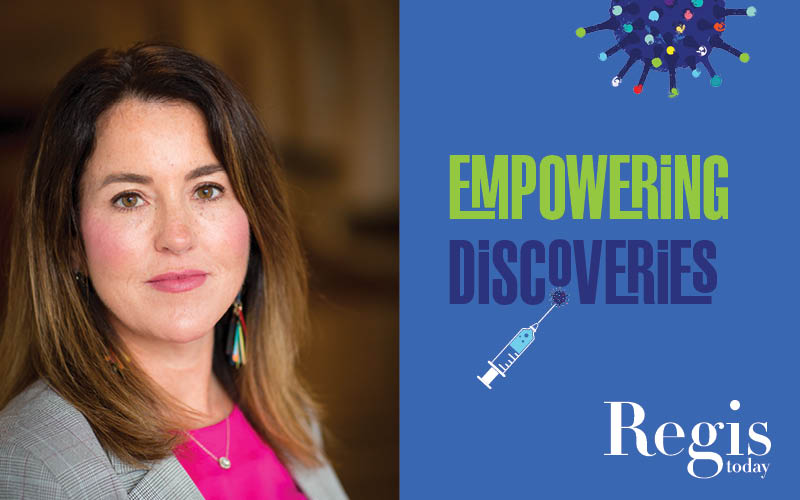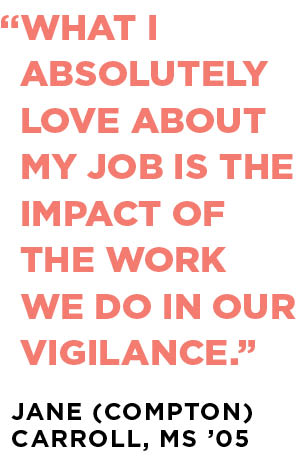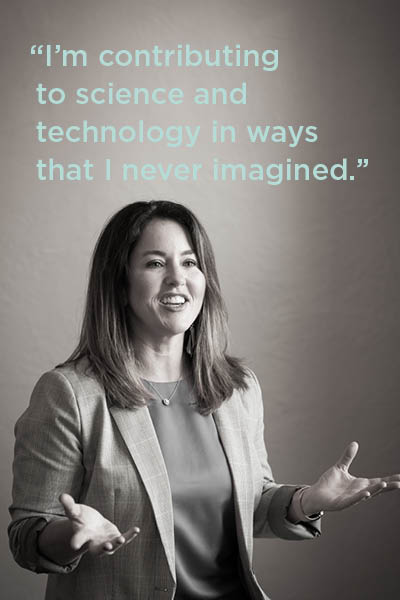
Story By Kristen Walsh | Photos by Kathleen Dooher
Sometimes, timing is everything. When Jane (Compton) Carroll, MS ’05 headed to her mother’s home in Scituate, Massachusetts, weary from a shift as an emergency department (ED) nurse the night before, she expected it to be a typical Sunday afternoon visit. But when Barbara (Glacken) Compton ’64 pulled a Regis College graduate program flyer off the kitchen counter and handed it to her daughter, the wheels started turning.
“I loved trauma nursing, but it can also be grueling seeing people at the hardest times of their life,” Carroll says of working in the Boston Medical Center ED. “I wasn’t sure that was going to be what made me happy for a long, sustainable career and I was already having those sorts of internal thoughts.”
It was a crisp late fall day in 2004; the foliage on the drive evidenced the changing New England season—indicative of how Carroll’s career was about to change.
She recalls reading about the Regis Master of Science in Regulatory Affairs, particularly the option to focus on health product regulation and health policy.
“I thought it was a really innovative direction for nurses to work in pharma or other industries,” Carroll says. “I was interested.”
Finding Inspiration
Very soon after, Carroll signed up for an information session at Regis and enrolled in the program full time. She dove into topics like pharmaceutical drug development and how to bring a molecule through product development and regulatory approval. She remembers one evening when she listened to a guest speaker who was a registered nurse and worked for a major pharmaceutical company.
“She talked about pharmacovigilance and how she felt like she was nursing on a global scale,” Carroll says. “Her job was monitoring the safety of medication and making sure that the risks are understood and managed. That really spoke to me, and I knew that was what I wanted to do.”
When Carroll learned that the Regis program required an internship in a related field, it was a classmate working at Genzyme who told her about an opening for a health and regulatory archivist at the company. Carroll landed a three-month internship and soaked up all she could about documentation practices and inspection readiness. And, thanks to that classmate, she networked with people on the company’s pharmacovigilance team.
“I was able to have an educated conversation about what I knew from my Regis courses, what I wanted to learn, and what I had to offer,” Carroll says of the informal meetings she had. Three weeks later, she was offered a contract position that led to a full-time job at Genzyme as a safety specialist working on a unique clinical trial related to cardiac cell regrowth.
“What we do in pharmacovigilance is collect adverse events or side effect reports from clinical trials and people all over the world after a
drug is approved,” Carroll explains. “The rigorous process requires a team of experts including physicians and scientists who analyze the data with a goal of determining any potential risks of a medication, and what needs to be done to mitigate or manage these risks.”
Safety First
When one of her colleagues left Genzyme to join EMD Serono Inc. on Boston’s south shore, Carroll was recruited to join the team at the 350-year-old biopharmaceutical company that develops and offers therapies for specialty-care conditions like multiple sclerosis, infertility, and cancer.
The 15-year stint included positions of increasing scope focused on pharmacovigilance. “I started to simplify some of the processes and use some digital tools for the successful operationalization of U.S. drug safety strategies including those related to case processing, commercial programs, clinical development plans, and regulatory reporting,” Carroll says.
Next, she was promoted to a role responsible for affiliate safety strategy in the U.S., Canada, Mexico, and South America. “I learned so much about the culture and the amazing people and how their governments interact. Health systems in different countries are all somewhat different when it comes to how they consider adverse event reporting and public health.”
Carroll’s final post at EMD Serono was head of global patient safety regions and transformation office. “I led a transformation across the pharmacovigilance group, both the operations and the medical safety side, as we changed our operating model to really focus on the benefit-risk profiles of our products and streamline and prioritize our operational activities. It was really exciting to be a part of this strategic transformation.”
Proving Your Worth
It was in 2021, about a year after the pandemic hit, that Carroll became vice president of pharmacovigilance operations at Moderna in Cambridge, Massachusetts. In the realm of pharmaceutical and biotechnology companies, Moderna was small and young—founded in 2010. But the company had proven itself as a leader in the development and authorization of a COVID-19 vaccine based on a technology called messenger RNA (mRNA).
 According to the Centers for Disease Control, “mRNA vaccines use mRNA created in a laboratory to teach our cells how to make a protein—or even just a piece of a protein—that triggers an immune response inside our bodies. That immune response, which produces antibodies, is what protects us from getting infected if the real virus enters our bodies.” Moderna had been working on this vaccine technology long before the COVID-19 pandemic.
According to the Centers for Disease Control, “mRNA vaccines use mRNA created in a laboratory to teach our cells how to make a protein—or even just a piece of a protein—that triggers an immune response inside our bodies. That immune response, which produces antibodies, is what protects us from getting infected if the real virus enters our bodies.” Moderna had been working on this vaccine technology long before the COVID-19 pandemic.
“Many people may recall that when they received their vaccine, they were educated to report any adverse events to the Vaccine Adverse Event Reporting System (VAERS), which is co-sponsored by CDC and FDA. As a result of this education, VAERS received 10 times more adverse events in 2021 for COVID-19 vaccines than all vaccines in 2020,” Carroll says.
“My job in pharmacovigilance operations is to make sure that we’re receiving all of those reports and processing them within our central database so the physicians on our team can analyze any new information. The high volume of adverse effect reports was an incredible opportunity for me to streamline and digitize our processes in a really agile way.”
Carroll understands the magnitude of her work. “Moderna sees itself as a platform company—a digital company that also develops mRNA vaccines and is exploring and developing therapeutics for oncology, immunology, and other disease areas. So we have the opportunity
to build the right digital platform from the beginning.”
Collective Purpose
Getting it right is something that Moderna is committed to, particularly when it comes to accelerating the development of mRNA vaccines to prevent serious diseases. It’s an admirable goal but one that comes with logistical challenges, including those that Carroll worked on to help make the COVID-19 vaccine available outside of the U.S.
“We are literally having conver-sations with governments about how we’re going to exchange side-effect information and how we can comply with their different regulations—what they’re going to do and what we’re going to do to ensure public health.”
Carroll relies on some of what she learned in a Regis economics course. “We discussed the intricacies of health policies in different countries. That information has helped me to guide my team through these conversations with government agencies all over the world.”
When Carroll considers what keeps her inspired on the job, it relates to the people. “What I absolutely love about my job is the impact of the work we do in our vigilance. I always imagine the example of a woman in her 40s who is diagnosed with cancer and faced with the daunting decision of which treatment is best for her. My job is to help empower that woman with information, so she understands the risks associated with each treatment choice in order to make the best decision for herself.”
She sees connections between her work in the biotech industry and nursing. “Pharmacovigilance is nursing on a totally different scale. Instead of helping one individual patient at a time, we have this unbelievably important duty to share vaccine safety information with magnitudes of people at any given time. And that is just incredibly exciting.”
Carroll gets emotional just thinking about it. “I’m in awe of Moderna bringing this vaccine to hundreds of millions of people around the world—and in such a short time. It’s hard work, but you can literally feel a shared sense of purpose when you walk into the office building. It’s the most amazing thing I’ve ever experienced professionally; I’m contributing to science and technology in ways that I never imagined.”
Full Circle Moment
When Carroll reflects on her journey from nursing to pharmacovigilance, she isn’t surprised that her mother suggested the master’s program
at Regis. “Growing up I always knew that my mother and aunt [Cynthia Glacken ’65] graduated from Regis; it’s in our DNA,” Carroll jokes.
Compton was a “day hop” student, commuting from nearby Waban, who majored in psychology with a minor in education. She laughs as she remembers taking field hockey for a physical education requirement. “Our one-piece maroon uniforms were just slightly above the knee. We were not allowed to walk across campus to the playing field in those ‘skimpy’ things so we would don our trench coats to cover up as we walked over.”
Fast forward to Compton’s kitchen when she read the Regis flyer. “I was thinking it was smart of Regis to offer so many programs, undergraduate and graduate, for nurses. I saved it for Jane to see. She had been working as a nurse in a major hospital trauma ED for several years and was thinking of moving on. I put the information aside for her and it didn’t take long before she was enrolled at Regis.”

Compton is clearly proud of her daughter’s career. “Jane received her master’s degree from Regis and had an immediate offer from a big biotech company. From then on, it’s been a rewarding and successful climb up the ladder to her really important position at Moderna today. I am so very proud of my smart, capable daughter. And I’m happy that my Regis connection played a small part.”
Carroll is happy too. “I’m grateful to my mother for saving that flyer and sharing it with me; and I’m grateful to Regis. It gave me the foundation that I needed to enter the pharmaceutical and biotech industry and make an impact.”
Read more articles
Read the entire magazine online